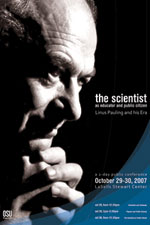Videos: Session 3: The Scientist as Public Citizen
Session Chair, "The Scientist as Public Citizen”
Chris Petersen (Ava Helen and Linus Pauling Papers, Oregon State University)
10:30 - Transcript Available
“The Scientist as Celebrity: Pauling, The Media, and the Bomb”
Tom Hager (Pauling biographer)
39:34 - Transcript Available
I will review how Pauling achieved his status as one of the most visible anti-Bomb activists of the era, not only because of his scientific analyses (which were sometimes flawed) but through his ability to use the media effectively. This would cover especially his TV appearances, speeches, use of public hearings, and publicity surrounding the petitions -- as well as touching on the downsides of negative publicity and his relatively fruitless efforts spent pursuing libel suits (illustrating that public recognition carries risks as well as benefits).
“Science in the McCarthy Period: Training Ground for Scientists as Public Citizens”
Lawrence Badash (History, University of California at Santa Barbara)
35:27 - Transcript Available
Demagoguery functions much like a preemptive strike: "Flag wavers" paint those who may be effective opponents as unpatriotic. This occurred during the period 1945-1960, as Joseph McCarthy and others stirred fears of Communist influence in the United States. At first lauded for their creation of the atomic bomb and other World War II activities, scientists increasingly were criticized for their international orientation and left-leaning politics. American scientists were sometimes denied passports, foreign scientists were often deprived of visas, barriers were erected to prevent the exchange of information, jobs were lost. But scientists fought back, occasionally changing policy or at least embarrassing officialdom. Such efforts reinvigorated a flagging sense of the need for political participation among scientists.
“The Evolution of Global Warming Science: From Ideas to Scientific Facts”
Warren Washington (National Center for Atmospheric Research, Boulder)
42:47 - Transcript Available
Through his discussion of global warming, a major topic in current political and social discourse, Dr. Warren Washington addresses the role of the scientist outside of the academic world. His talk examines the positions of many modern scientists in terms of their political and ethical dialogue with their colleagues, with policymakers, and with the general public. Corresponding with his central topic, Dr. Washington offers current data regarding the phenomenon of global warming and its socio-political outgrowths. Washington also addresses Linus Pauling’s anti-war activism and compares it to current academic support for scientific and social awareness.
“Advocates for Science: The Role of Academic Environmental Scientists”
Jane Lubchenco (Zoology, Oregon State University)
46:33 - Transcript Available
Dr. Lubchenco uses her experience with marine biology and oceanic conservation to discuss the changing role of the scientist as public citizen. Through examination of the political and economic ramifications of humanity's impact upon our planetary ecology, Lubchenco illustrates the development of positions within the scientific community on matters of global importance. She explores the tensions felt by scientists and discusses the various factors that spur researchers to step out of the academic sphere and into the public conscience. Dr. Lubchenco also attempts to define, in this age of technology, the point at which science and ethics collide.
“Panel Discussion of Session III Topics”
Chris Petersen, Tom Hager, Lawrence Badash, Warren Washington, Jane Lubchenco
15:38 - Transcript Available
Tom Hager, Lawrence Badash, Warren Washington and Jane Lubchenco address questions presented by the public. The panel discussion revolves around problems of scientific involvement in current ecological issues. The speakers attempt to explore public and commercial interests related to contemporary environmental debates. They also speak on the role that scientists have historically filled in such discussions as well as modern changes to the traditional status of academics.
Watch Other Videos
Session 1: Scientists and Textbooks
- Mary Jo Nye - Session Chair, "Scientists and Textbooks”
- Michael Gordin - “Periodicity, Priority, Pedagogy: Mendeleev and Lothar Meyer”
- Ana Simões - “Textbooks as Manifestos: C. A. Coulson after Linus Pauling and R. S. Mulliken”
- Ken Krane - “Making a Modern Physics Textbook: The Collision of Full-Time Commitments”
Session 2: Popular and Public Science
- Cliff Mead - Session Chair, "Popular and Public Science”
- Bassam Shakhashiri - “On Bonding with the Public”
- Robert Anderson - “Circa 1951: Presenting Science to the British Public”
- Stephen Lyons - “Bringing Chemistry to Prime Time”
- Dudley Herschbach - “Linus Pauling as an Evangelical Chemist”
Session 3: The Scientist as Public Citizen
- Chris Petersen - Session Chair, "The Scientist as Public Citizen”
- Tom Hager - “The Scientist as Celebrity: Pauling, The Media, and the Bomb”
- Lawrence Badash - “Science in the McCarthy Period: Training Ground for Scientists as Public Citizens”
- Warren Washington - “The Evolution of Global Warming Science: From Ideas to Scientific Facts”
- Jane Lubchenco - “Advocates for Science: The Role of Academic Environmental Scientists”
- Chris Petersen, Tom Hager, Lawrence Badash, Warren Washington, Jane Lubchenco - “Panel Discussion of Session III Topics”


